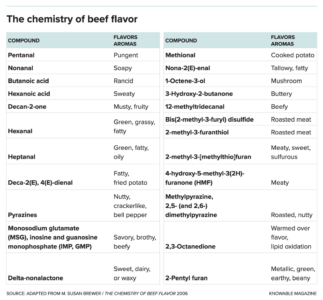If you can’t frown you can’t be sad — plus recovery scents, the chemistry of steak, and more!
26 Jun 2021
Posted by Andrew Kantor
Does this smell like recovery to you?
Covid survivors might be dealing with permanent organ damage, reduce gray matter, and monstrous medical bills, but here’s some good news: Apparently that lost sense of smell does eventually come back (probably).
By the four-month mark, objective testing of 51 of the patients showed that about 84% (43) had already regained a sense of smell, while six of the remaining eight patients had done so by the eight-month mark. Only two out of the 51 patients who’d been analyzed using the specialized tests had some impaired sense of smell one year after their initial diagnosis, the findings showed. Overall, 96% of the patients objectively recovered by 12 months. (Emphasis ours.)
Covid vaccines and breastfeeding in 6 seconds
The vaccines don’t end up in breast milk, but the antibodies do — and that’s good news. (The rest of the almost-3,000 words is all about how researchers learned this, the wonders of breast milk, etc.)
Trace minerals now, low BP later
Pregnant women who have a bit of exposure to everyone’s favorite trace minerals — manganese and selenium — have babies who just may grow up to be teens without high blood pressure.
Johns Hopkins researchers looked at data for about 1,200 women and their kids, did the usual statistical magic, and …
… found that higher levels of selenium or manganese in the mothers’ blood were associated with lower blood pressure readings in their children at clinic visits 3 to 15 years later.
How does it do that? In part, at least, the manganese seems to counter the blood pressure-raising effect of cadmium, which mom may also have been exposed to. But there’s more to figure out.
Cigna’s new way to cut costs
Cigna to patients: ‘Switch to a (cheaper) biosimilar for Remicade and we’ll give you $500.’ It’s a one-time thing, but the incentive, called the “Shared* Savings Program” is expected to save the company a nice chunk of change, what with Remicade costing $30,000 a year, a lot more than biosimilars Avsola and Inflectra.
The program will eventually expand to other biosimilars, and Cigna hopes the program “can generate excitement among members about biosimilar drugs.”
* Shared: The company saves millions, you get $500.
Tell me something (about antacids and diabetes) I don’t know
Big headline out of the University of Maryland caught my attention: “OTC antacids may control blood sugar for diabetics”. Researchers there say that some proton pump inhibitors “were shown to reduce fasting blood sugar levels and levels of HbA1c.”
This sounded familiar, though. Turns out it’s not big, new news (sorry Terripins): A Canadian endocrinologist was talking about that back in 2017, and she cited a 2015 paper. (That doesn’t make it less interesting, just less newsy.)
The oddest take on ‘fake it till you make it’
There are those who believe that Botox can ease depression. Not chemically — but by making it harder to frown: “[B]y eliminating negative emotional feedback that frowns feed the brain, Botox can relieve depression.”
This isn’t really new. The idea that smiling can make you happy (perhaps by opening up a different set of blood vessels and thus signalling the brain “I’m happy!”) has been around for a while. But the opposite — if you can’t frown, you’ll be less depressed … well, we’ll wait for more evidence.

If you’re happy and you know it
Easing their pain
If you have patients with fibromyalgia, be aware that there’s a good chance they’re taking or considering taking CBD to help with the pain — usually as a substitute for opioids.
A University of Michigan study found that…
… more than 70% of people with fibromyalgia who used CBD substituted CBD for opioids or other pain medications. Of these participants, many reported that they either decreased use or stopped taking opioids and other pain medications as a result.
Coupla notes: First, it’s referring to “70% of people … who used CBD,” meaning not 70% of all fibromyalgia patients.
Second, they found that patients who used products with both CBD and THC were even more likely to skip the opioids. (In fact, they were surprised that CBD-only product seemed to work so well.)
The taste of addiction
It seems that flavored electronic cigarettes affect people differently than non-flavored ones. Penn State psychiatry researchers found that e-cigs with flavor, because they trigger the whole taste-sensation part of the brain, engaged the taste regions, while unflavored e-cigs engaged the reward region.
In a practical sense, for smokers using e-cigs to transition to a normal lifestyle, unflavored cigs hit the sweet spot, acting as a substitute. But for people just starting their nicotine-addiction journey, the flavors are more important.
Useful information if you want to stop people from getting addicted in the first place.
Today’s non-pharma chemistry story
You folks like chemistry, right? Right. So check out the chemistry of grilling the perfect steak. You’ll be impressing the neighbors before you can say “Malliard reaction.”



